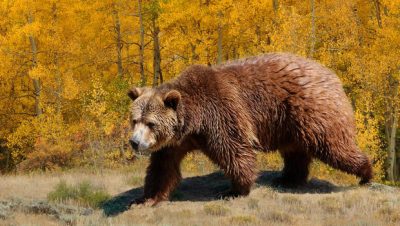Lawsuit Challenges Trump Administration’s Authorization to Kill 72 Grizzlies Near Yellowstone

The Center for Biological Diversity and Sierra Club filed a lawsuit today challenging the U.S. Fish and Wildlife Service’s decision to allow 72 grizzly bears to be killed to accommodate livestock grazing in Wyoming’s Bridger-Teton National Forest, near Yellowstone National Park.
The grazing program area, approved by the U.S. Forest Service late last year, encompasses the headwaters of the Green and Gros Ventre rivers and two designated wilderness areas. The area provides important habitat for Yellowstone grizzly bears — listed as threatened under the Endangered Species Act — and other imperiled fish and wildlife species.
The challenged decision authorizes the killing of up to 72 grizzly bears over the 10-year life of the reauthorized grazing program. The decision places no limits on killing female bears or cubs, even though females with cubs live where the proposed killing would be permitted.
“It’s outrageous that the feds are caving to the livestock industry by allowing dozens of grizzly bears to be killed in their crucial habitats on public lands,” said Andrea Santarsiere, a senior attorney at the Center for Biological Diversity. “Yellowstone’s grizzly bears are a national treasure that should be protected, not slaughtered.”
The Endangered Species Act requires that the Fish and Wildlife Service and Forest Service analyze the grazing program’s risk to grizzly bears. In its 2019 “biological opinion,” the Fish and Wildlife Service concluded that killing 72 grizzly bears will not cause “jeopardy” to the grizzly bear population.
This analysis, however, hinges on the Forest Service’s commitment to implement conservation measures that are inadequate, largely unenforceable, and will not protect grizzly bears or livestock.
For example, Fish and Wildlife does not require ranchers to haul off livestock carcasses when cattle die from other causes. Instead they need only move them half a mile from the nearest road, where the carcasses may attract grizzly bears that then can be killed. Consistent use of range riders, guard dogs, close herding of cattle or other effective conflict measures are not required.
“Time and time again, the Fish and Wildlife Service has upped the number of grizzly bears that can be killed as a direct result of livestock grazing on public lands in the Upper Green,” said Bonnie Rice, senior representative with Sierra Club’s Our Wild America campaign. “There are proven, effective ways to prevent conflicts between bears and livestock to keep both safe. Allowing another 72 grizzlies to be killed without first requiring conflict prevention practices by livestock producers is unconscionable.”
On Jan. 21, 2020, the Center for Biological Diversity and Sierra Club notified the Fish and Wildlife Service and Forest Service of their intention to file a lawsuit. Today’s lawsuit was filed in the U.S. District Court of Washington, D.C.
*
Note to readers: please click the share buttons above or below. Forward this article to your email lists. Crosspost on your blog site, internet forums. etc.

